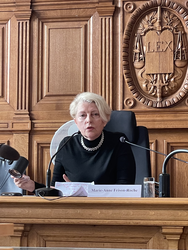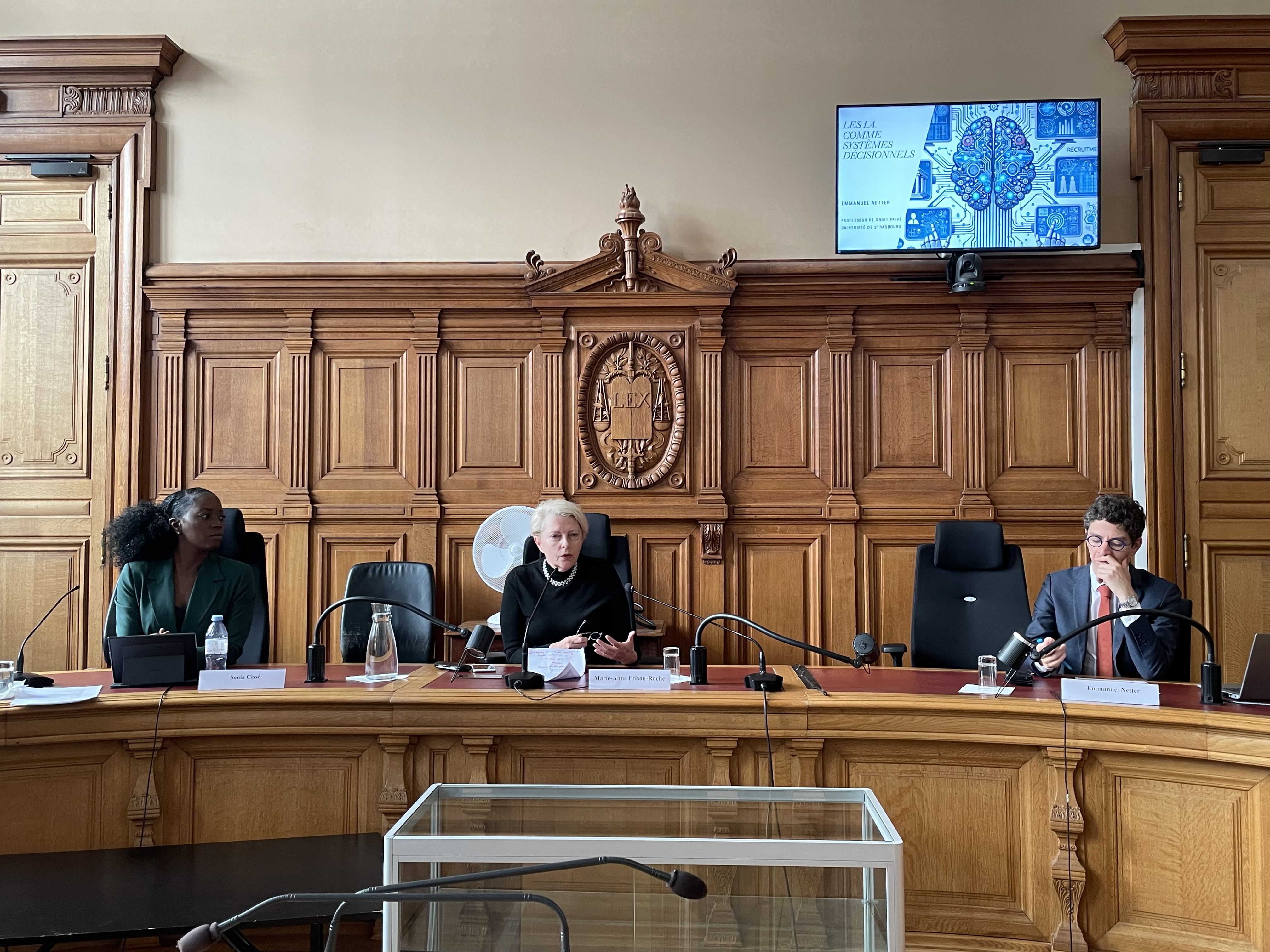Sept. 12, 2024
Conferences

🌐follow Marie-Anne Frison-Roche on LinkedIn
🌐subscribe to the Newsletter MAFR Regulation, Compliance, Law
____
► Full Reference: M.-A. Frison-Roche, participation to the round table "Le droit à l'enfant : réalité ou faux concept ?" ("The right to a child: reality or false concept?"), in Regards croisés sur les nouvelles filiations, Cour d'appel de Paris (Paris Court of Appeal), September 12, 2024
____
🧮see the full programme of this event
____
► Summary of the conference:
________
June 24, 2024
Conferences

► Full Reference: M.-A. Frison-Roche, "Les deux rencontres entre l'intelligence artificielle et le Contentieux Systémique" ("The two meetings between Artificial Intelligence and Systemic Litigation"), in L’intelligence artificielle, nouveau champ de Contentieux Systémique (Artificial intelligence, new field of Systemic Litigation), in cycle of conferences-debates "Contentieux Systémique Émergent" ("Emerging Systemic Litigation"), organised on the initiative of the Cour d'appel de Paris (Paris Cour of Appeal), with the Cour de cassation (French Court of cassation), the Cour d'appel de Versailles (Versailles Court of Appeal), the École nationale de la magistrature - ENM (French National School for the Judiciary) and the École de formation des barreaux du ressort de la Cour d'appel de Paris - EFB (Paris Bar School), under the scientific direction of Marie-Anne Frison-Roche, June 24, 2024, 11am-12.30pm, Cour d'appel de Paris, Cassin courtroom.
____
🧮see the full programme of this event
____
► English Summary of the conference: In the general presentation on the theme itself, I underlined "The two meetings between Artificial Intelligence and Systemic Litigation".
The focus of this conference is not the state of what is usually called Artificial Intelligence, but rather how to correlate AI and "Emerging Systemic Litigation" (ESL).
This involves recalling what "Systemic Litigation" is (1), then looking at the contribution of Artificial Intelligence to dealing with this type of litigation (2), before considering that the algorithmic system itself can be a subject of Systemic Litigation (3).
1. What is the Systemic Litigation that we see Emerging?
On the very notion of "Emerging Systemic Litigation" (ESL), proposed in 2021, read : M.-A. Frison-Roche, 🚧The Hypothesis of the category of Systemic Cases brought before the Judge, 2021
Emerging Systemic Litigation concerns situations that are brought before the Judge and in which a System is involved. This may involve the banking system, the financial system, the energy system, the digital system, the climate system or the algorithmic system.
In this type of litigation, the interests and future of the system itself are at stake, "in the case". The judge must therefore "take them into consideration"📎
In this respect, "Emerging Systemic Litigation" must be distinguished from "Mass Litigation". "Mass litigation" refers to a large number of similar disputes. The fact that they are often of "low importance" is not necessarily decisive, as these disputes are important for the people involved and the use of A.I. must not overpower the specificity of each one. The fact remains, however, that the criterion for Systemic Litigation is the presence of a system. It may happen that a mass litigation calls into question the very interest of a system (for example, value date litigation), but more often than not the Systemic Litigation we see emerging is, unlike mass litigation, a very specific case in which one party, for example, formulates a very specific claim (e.g., asking for considerable work to be stopped) against a multinational company, and will thus "call into question" an entire value chain and the obligations incumbent on the powerful company to safeguard the climate system, which is therefore present in the proceedings (which does not, however, entitle it to make claims, but which must be taken into consideration).
2. The contribution of Algorithmic Power in the conduct of a Systemic Litigation
In this respect, AI can be a useful, if not indispensable, tool for mastering such Systemic Litigation, the emergence of which corresponds to a novelty, and the knowledge of which is brought before the Ordinary Law Judge.
Indeed, this type of litigation is particularly complex and time-consuming, with evidentiary issues at the heart of the case, and with expert appraisal following on from expert appraisal. Expert appraisals are difficult to carry out. AI can therefore be a means for the judge to control the expert dimension of Systemic Litigation, in order to curb the increased risk of experts capturing the judge's decision-making power.
The choice of AI techniques presents the same difficulties as those that have always applied to experts. It is likely that certification mechanisms, analogous to registration on expert lists, will be put in place, if we move away from construction by the courts themselves (or by the government, which may pose a problem for the independence of the judiciary), or if we want control over tools provided by the parties themselves, with regard to the principle of equality of arms due to the cost of these tools.
3. When it is the Algorithmic System itself that is the subject of a Systemic Litigation: its place is then rather in defense
Moreover, the algorithmic system itself gives rise to Systemic Litigation, in that individuals may bring a case before the courts claiming to have suffered damage as a result of the algorithmic system's operation, or seeking enforcement of a contract drawn up by the system. It is in the realm of the Ordinary Contract and Tort Law that the system may find itself involved in the jurisdictional proceedings.
It is noteworthy that, compared with the hypotheses hitherto favored in previous conference-debates, notably those of April 26, 2024 on Emerging Systemic Litigation linked to the Duty of Vigilance📎
However, the instance changes if the system is no longer presented as the potential "victim" but rather as the potential "culprit". In particular, it is much less clear what type of intervener in the proceedings, who is not necessarily a party to the dispute, should speak to explain the system's interest, particularly with regard to the sustainability and future of the AI system.
This is an area for further consideration by heads of courts.

________
🕴️Fr. Ancel, 📝Compliance Law, a new guiding principle for the Trial?, in 🕴️M.-A. Frison-Roche (ed.), 📘Compliance Jurisdictionalisation, 2024.
🧮La vigilance, nouveau champ de contentieux systémique (Vigilance, new field of Systemic Litigation), in cycle of conference-debates "Contentieux Systémique Émergent" ("Emerging Systemic Litigation"), organised on the initiative of the Cour d'appel de Paris (Paris Cour of Appeal), with the Cour de cassation (French Court of cassation), the Cour d'appel de Versailles (Versailles Court of Appeal), the École nationale de la magistrature - ENM (French National School for the Judiciary) and the École de formation des barreaux du ressort de la Cour d'appel de Paris - EFB (Paris Bar School), under the scientific direction of Marie-Anne Frison-Roche, June 24, 2024.
Updated: July 31, 2013 (Initial publication: Nov. 8, 2011)
Teachings : Les Grandes Questions du Droit, semestre d'automne 2011
